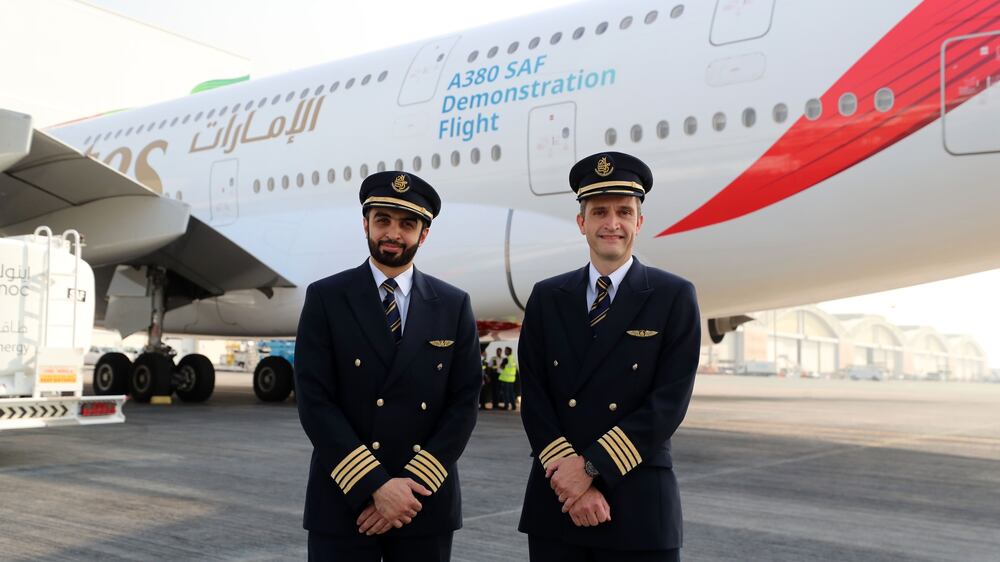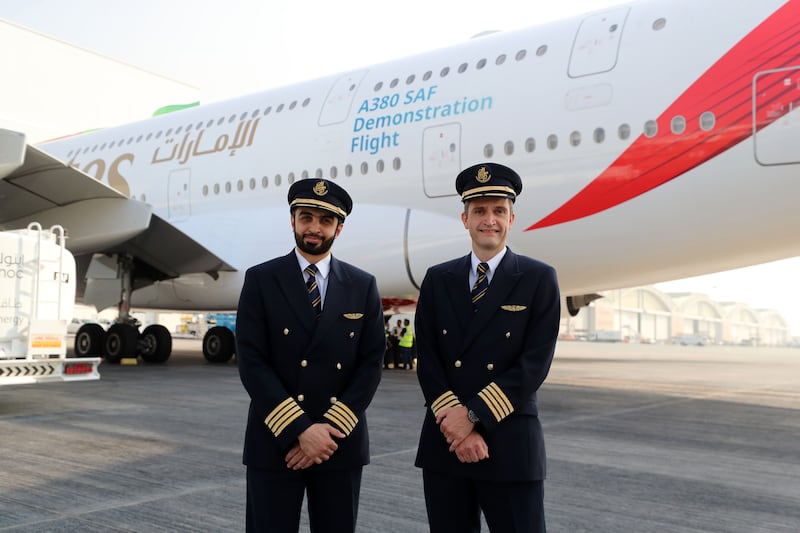Gulf countries must quickly begin to produce their own sustainable aviation fuel to gain a share of western-dominated market while supporting a push for greener flights by their national airlines, a UAE official has said.
The global supply of SAF is limited, making it three to five times more expensive than traditional jet fuel and more difficult to secure sufficient quantities for long-haul flights, said Maryam Al Balooshi, the country's lead negotiator for aviation climate change and director of the environment department at the General Civil Aviation Authority.
“If Emirates airline alone purchased all the SAF available worldwide, it would not cover its operations because there isn't enough quantity,” she told The National.
“You have one of the biggest airlines in the world flying everywhere, so you don't want to be limited by SAF production in one region or one state. By 2030, [the] US and Europe will be the biggest SAF producers and we don't have local supplies.
“We need to accelerate production in this region. We don't wait for them to control the market. Controlling the market and limited SAF availability means that the price will stay high.”
The global sustainable aviation fuel market is expected to reach about $14.8 billion by 2032, from $617 million last year, growing at a compound annual rate of more than 42 per cent, according to Precedence Research.
Due to increased air traffic and passengers, North America leads the market for sustainable aviation fuel globally.
Global airlines consider sustainable jet fuel as key to their goal of achieving net-zero emissions by 2050. Despite high demand, supply is small while the costs are high, resulting in slow progress.
SAF is typically derived from animal fats, used cooking oil and other feedstocks. It can also be produced synthetically through a process that captures carbon directly from the air.
The greener fuel could contribute nearly 65 per cent of the reduction in emissions needed by aviation to reach net zero by 2050, according to the International Air Transport Association, which represents about 320 airlines that account for 83 per cent of global air traffic.
Although SAF accounted for only 0.2 per cent of aviation’s fuel needs in 2023, every drop available of the greener fuel was bought at a total cost of about $1 billion, the airline lobby group said.
In November 2023, a UN-led conference in Dubai agreed on a target to reduce the carbon emissions of the global aviation sector by 5 per cent by 2030 through the use of SAF.
Emirates breakthrough: A380 demo flight success using sustainable bio aviation fuel

UAE's SAF ambitions
The UAE, a global aviation hub and home to six national airlines, is working on strategies and initiatives related to the production and use of SAF.
In December, the country's Cabinet approved the guideline on sustainable aviation fuel, which calls for at least 1 per cent of the total fuel supplied to UAE airlines at airports in the Emirates in 2031 to be sustainable and produced locally.
The country's National Sustainable Aviation Fuel Roadmap states that by 2030, the UAE will develop domestic capacity to produce 700 million litres of the greener fuel on an annual basis.
This will reduce an estimated cumulative 4.8 million tonnes of carbon dioxide by 2030 and create up to 18,000 new jobs across the value chain in the process, according to the road map.
The volume of SAF will require the establishment of three to five production plants in the UAE. It is estimated that $7 billion to $9 billion in investment will be required at SAF production plants, the document showed.
The Emirates also aims to export some of its locally produced SAF in future, which could provide a cumulative $1.7 billion of export revenue for the country by 2030.
Higher ticket prices
After surviving the Covid-19 pandemic, the aviation industry's worst crisis in its history, airlines are now grappling with a multitrillion-dollar bill to fight their next big threat – decarbonisation.
They are expected to pass on some of that cost to passengers, leading to more expensive fares on some routes, particularly if SAF prices remain elevated.
“For sure, ticket prices will increase. Airlines keep telling us that if SAF is available and at current prices, the cost will be moved to the passengers,” Ms Al Balooshi said.
“We don't want our airlines to take that step. Imagine if travel became a luxury for some people. Then you lose market share.”
The UAE is advocating the use of lower carbon aviation fuels (LCAF) – due to their immediate potential to decarbonise the sector – as an interim step until SAF is more widely available.,
“LCAF is a transitioning fuel until we reach the right quantity and right price of SAF, so you don't jump immediately,” she said.
The production of LCAF is a big project “to make sure that our airlines are flying with the right fuel, with lower-carbon intensity”.
This is a process of producing jet fuel from fossil fuels but through technology that makes its carbon intensity lower than that of the fuel currently available by 10 per cent to 15 per cent, said Ms Al Balooshi.
Production of LCAF can start once its certification by the International Civil Aviation Organisation has been completed by 2025, she said.
While the UAE does not grow the feedstock required for production of SAF, it is exploring options such as the production of so-called “power-to-liquid” SAF, she said.
“We are opening this dialogue … do we need to collaborate to import the feedstock and process it here? Or do we produce it elsewhere and bring it back? There's lots of details to tackle,” Ms Al Balooshi said.







